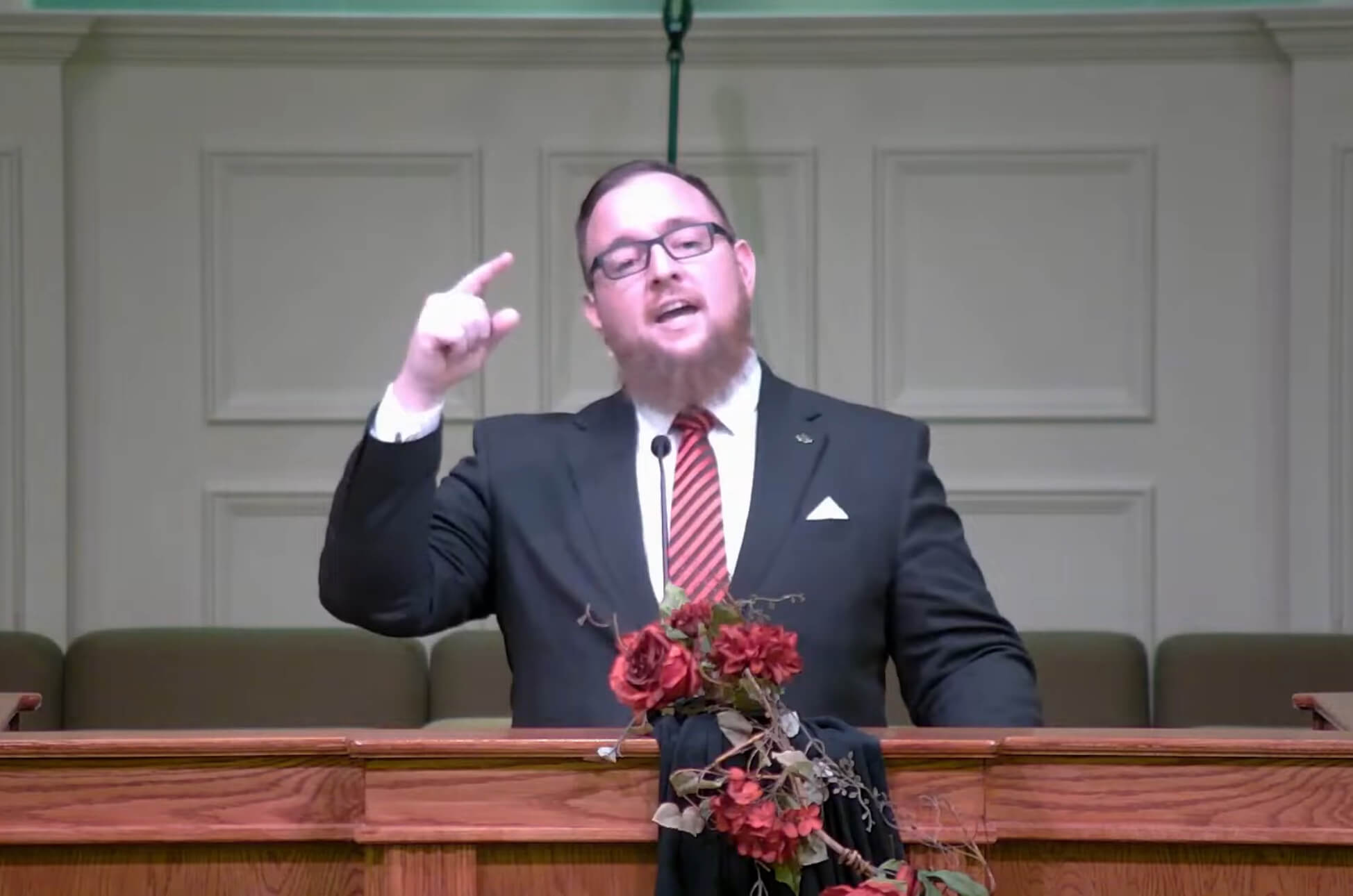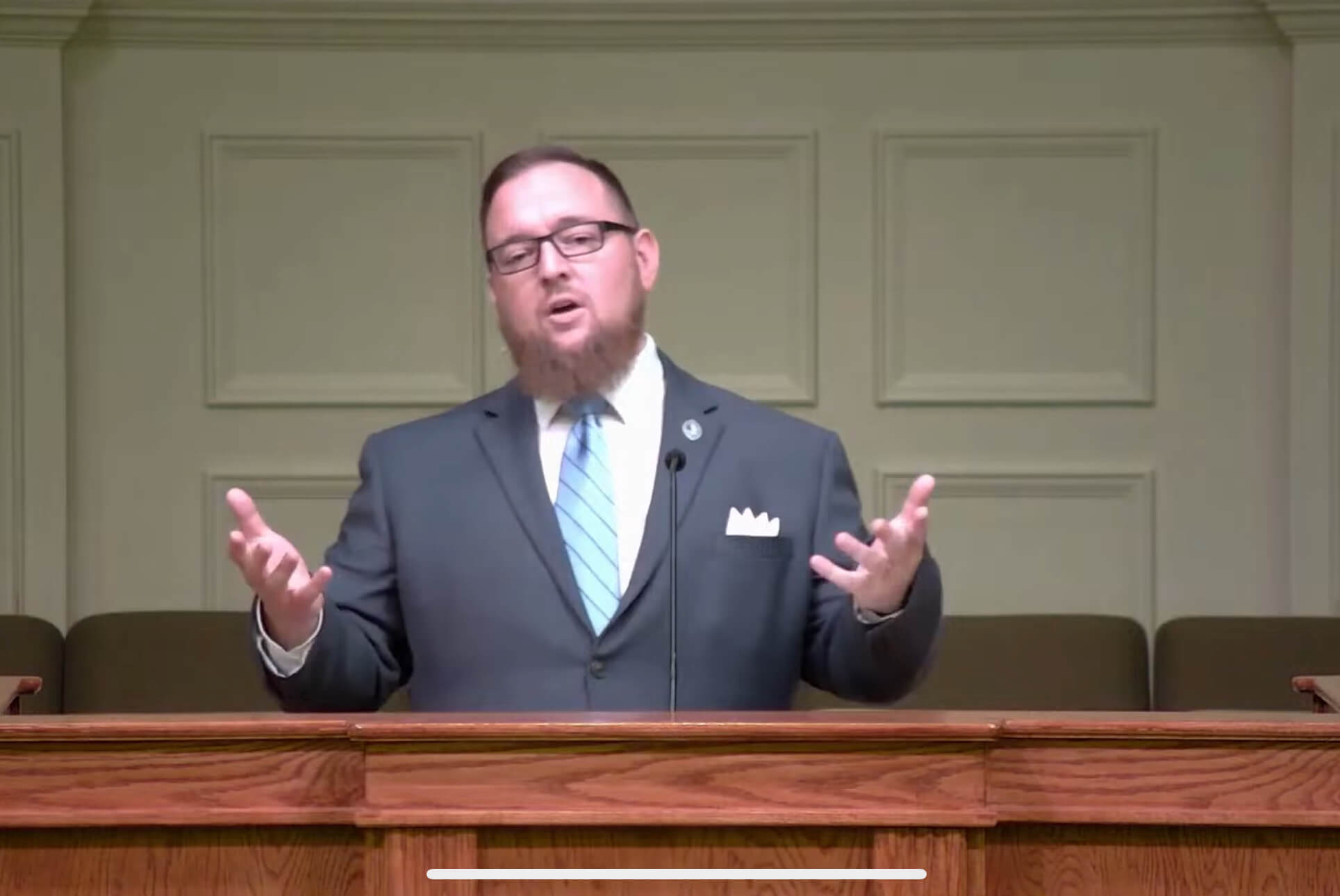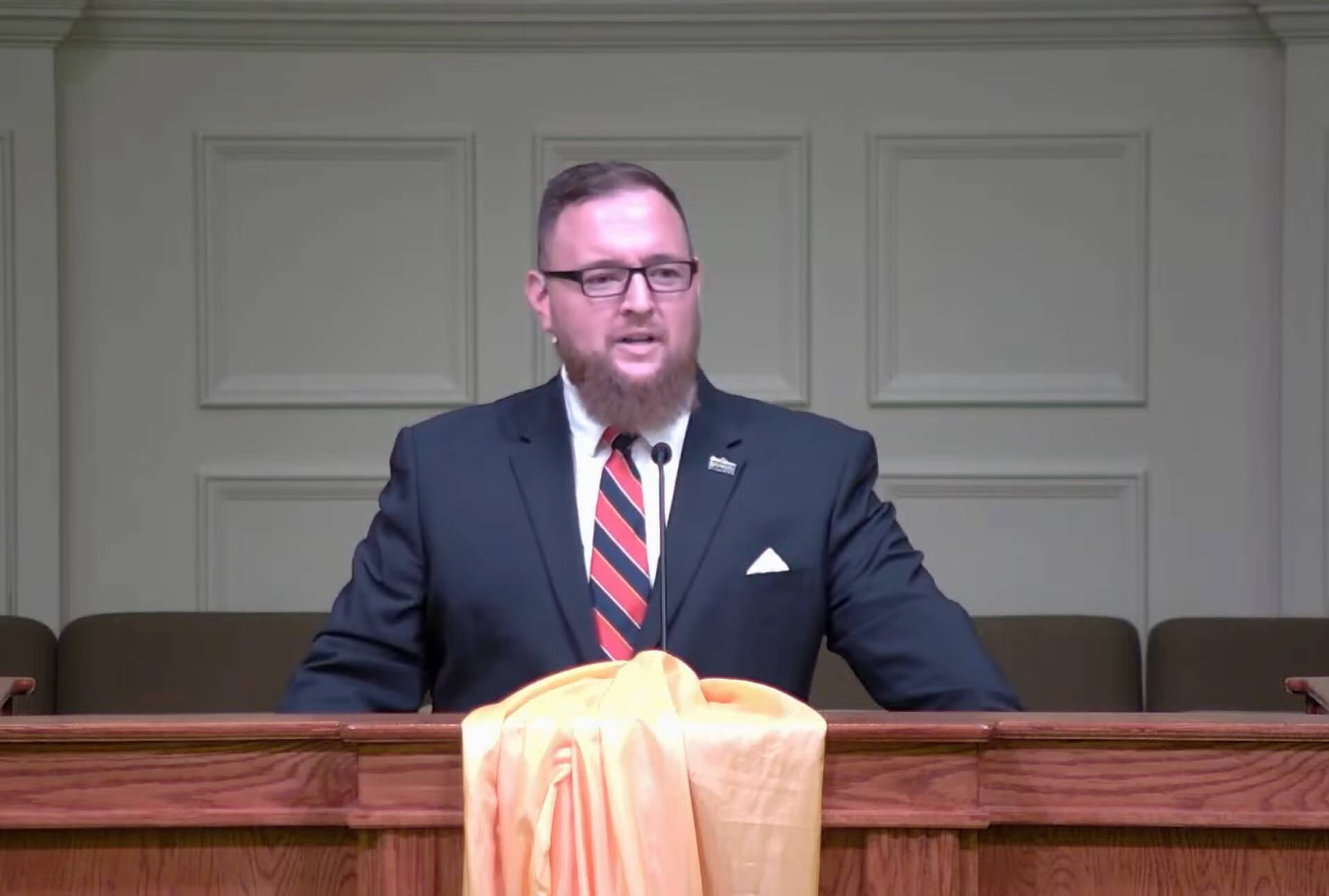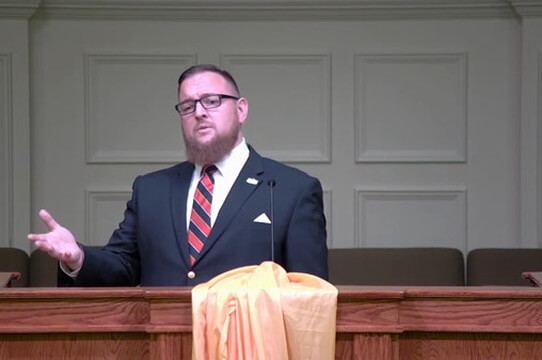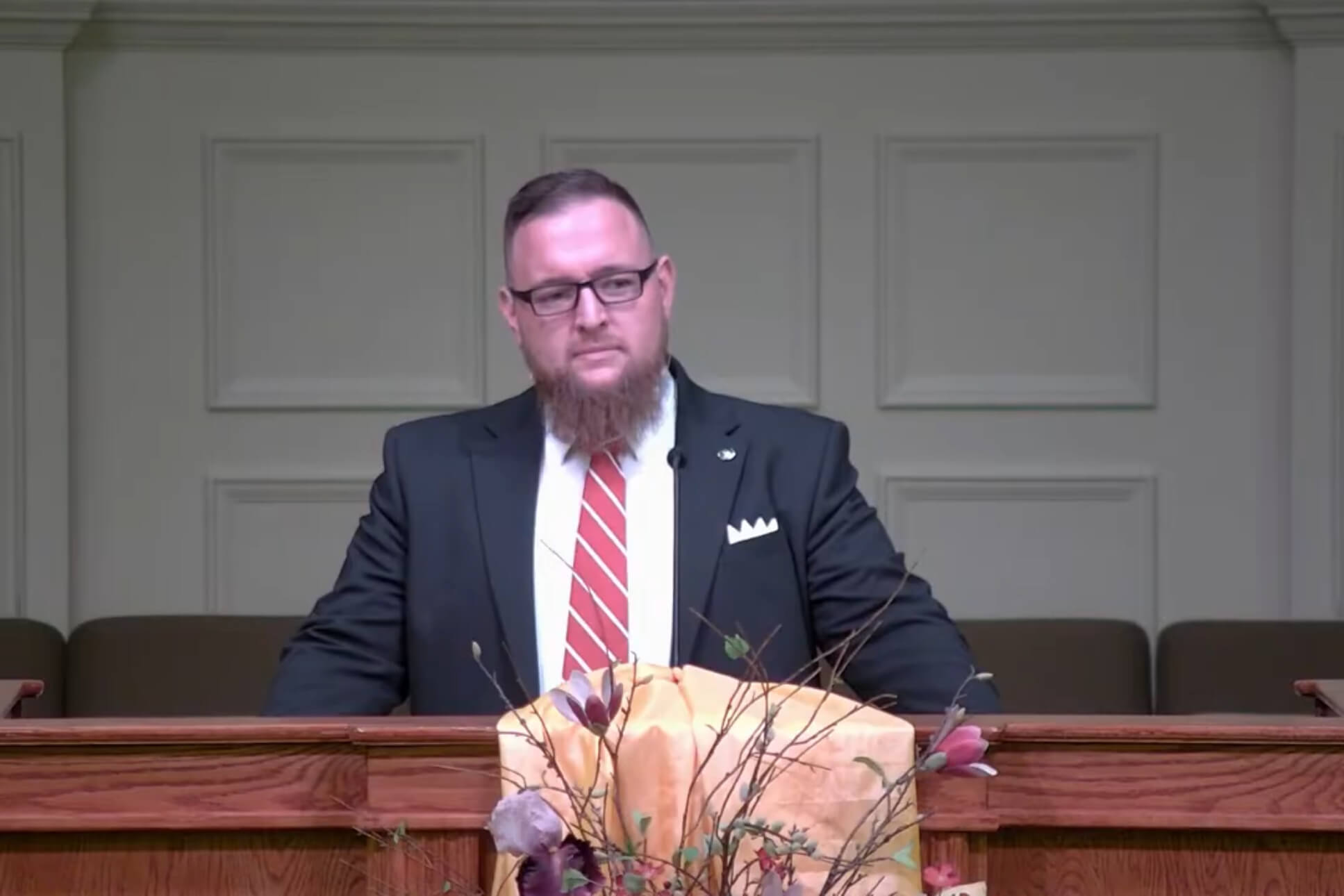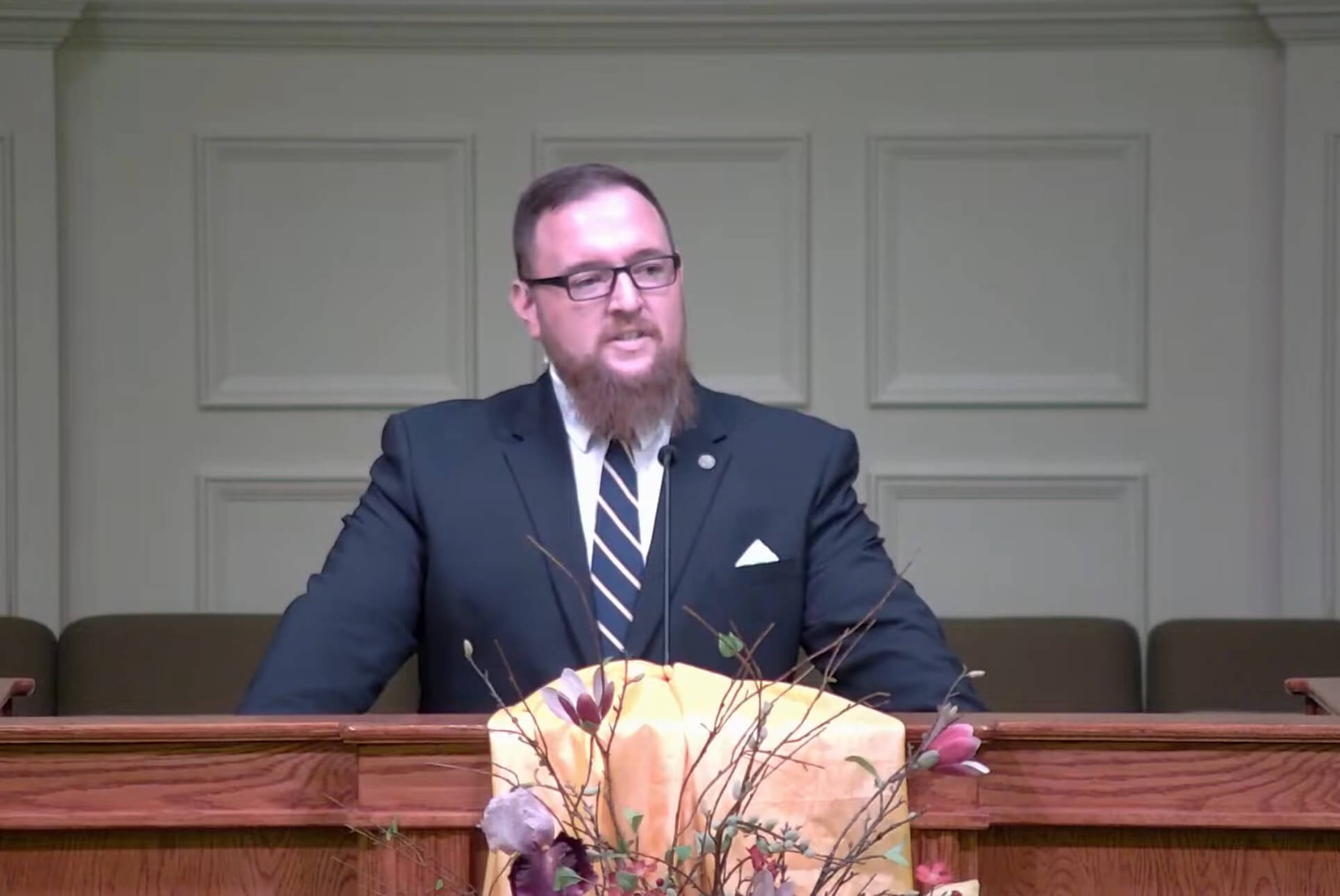Video
“The Word Incarnate Pt. 2”
John 1:14-18
Pastor Ryan J. McKeen
02/16/2025
Audio
Transcript
Turn with me in your Bibles to the Gospel of John, the Gospel of John. And we are in John chapter 1, and we are again in the prologue.
The title of this sermon is The Word Incarnate Part 2, because we started this passage last week. We started with verse 14 last week, and that’s as far as we made it. But as we sang that song, we typically sing that song around Christmastime because at Christmastime we remember the incarnation. And that’s what we are thinking about this morning as we come to this passage that speaks of the incarnation, that speaks of this greatest of miracles that happened so long ago.
And again, as we approached this text, this section of the text, verses 14 through 18 of chapter 1, again, we got through verse 14, which was our first observation of this text, which is the fact of the incarnation. John comes out and states the fact that the word became flesh. And that word incarnation, that’s what it means. It means to take on flesh or to become flesh. And again, that’s the exact phrase we see there in verse 14. And as we considered last week, the incarnation of Christ is one of the most wondrous miracles, one of the most unfathomable miracles in all of scripture.
That the infinite, eternal, almighty God took on flesh. He took on the nature of finite, dependent, mortal humans. And he took that human nature and human flesh into personal union with his divine nature. And he did that all without changing who he always was. The unchangeable God became what he wasn’t, while never changing being what he always was. You see, in the fall, in Genesis chapter 3, where Adam and Eve sinned, all of mankind then fell into this state of rebellion. Everyone after them is born with their sinful nature. And because of that, we have destroyed ourselves and our relationship with God. We are born without a relationship with God. We’ve offended the infinitely holy God, not only by our sin nature, but by each of our own disobedience. And our sinfulness requires a punishment.
And the Bible tells us that the wages, the punishment due, the payment that’s due for sin is death. A death must be paid. And not just death where we just simply stop existing. A death that sends us to an eternity in hell under the divine, eternal, infinite wrath of God. And no man could ever satisfy that infinite penalty and yet live to enjoy a restored relationship. But there’s a problem. because only a man could ever righteously offer that satisfactory atonement, that payment that was due. So we are left with this dilemma, as we considered last week, that only God Himself could atone for sin, and yet only man’s sacrifice would be accepted on man’s behalf. And as I read this quote last week from Dr. Mike Riccardi, he says it so well when he says it this way, no one ought to pay but man. And no one can pay but God. And so to reconcile man to God, God became man. That’s the reason for the incarnation.
That is why Jesus came and took on flesh. Because that’s the only way. The only way that God could bring sinners to himself. That’s why Jesus had to take on our human nature and our human flesh and everything it is to be human except our sin. One of the early theologians in the church by the name of Gregory He famously said this, what he did not assume, he cannot redeem, which means in order to redeem us, he had to take on everything that we are, our humanity, our human nature, our flesh. Jesus had to become everything he was going to redeem. He had to become a real man with a real human mind, a human will, and a human body. with all the limitations that that entails. And the reason that every part of the believer is redeemed is because Jesus became exactly like us, except for our sin.
He was perfect. He lived perfectly. Because he had no human father, he had no sin nature. He was born without sin. But He took the sins of His people upon Himself on the cross. Of all those who would come to believe in Him, of all those in the past that looked forward to the promises of God being fulfilled, Jesus took their punishment in their place. And because Jesus Christ is fully and truly a man, He is able to stand in man’s place. He is that perfect sacrifice. Only Jesus could bear man’s punishment and accomplish man’s righteousness. Because at the same time that He is fully and truly man, He is fully and truly God. And so he is able to bear the infinite wrath of God against our sins without perishing eternally as we would. But he rose again. He rose again the third day. And he lives to make intercession for his saints.
That is the gospel. And that is all found in this miracle of the incarnation. This is the most glorious of all of God’s works, the most impossible, the most unfathomable, the miracle of all miracles. God became man. And that is the fact of the incarnation. Verse 14, the Word became flesh and dwelt among us. And we beheld His glory, glories of the only begotten, from the Father, full of grace and truth. And we considered those things last week. He became flesh. He dwelt, or He tabernacled among us. He made God’s presence to dwell among man. And those two statements tell us that He is truly God and He’s truly man. He is God with us, as Matthew says. And we will see that again someday when he returns to be God’s tabernacle among men once again. We looked at Revelation 21 last week to see that. And as John says, he is the only begotten of the Father, full of grace and truth. Who sent from God, he is God. He’s the fullness of grace, the fullness of truth. He is the truth we must believe to be saved. And that brings us up to speed in our section of this passage this morning. We’re up through verse 14.
So let me read our passage again as we focus in here on the remainder of John’s prologue. So starting again in verse 14 of John 1. And the Word became flesh and dwelt among us. We beheld His glory. Glory is of the only begotten from the Father, full of grace and truth. John bore witness about him and cried out, saying, this is he of whom I said, he who comes after me has been ahead of me, for he existed before me. For of his fullness we have all received, and grace upon grace. For the law was given through Moses, Grace and truth came through Jesus Christ. No one has seen God at any time. The only begotten God who is in the bosom of the Father, he has explained it.
So we’ve seen the fact of the incarnation in verse 14, and now we come to our second observation in this text, the witness to the incarnation. And here in verse 15 and 16, we see two witnesses to the fact that Jesus did come and that he did what he said he did. The first witness we see is John. We were introduced to John the Baptist a few weeks ago in verses six through eight. And the author of this book, the apostle John, his whole purpose in this gospel is to provide us with witnesses to who Jesus was, who Jesus is. He says at the end of his gospel, these things have been written so that you may know. That Jesus is the Christ, the Messiah, the Chosen One, the Son of God. And that by believing, you may have life in His name. That’s John’s whole purpose. So he provides us with evidence after evidence, witness after witness. And the first witness he mentions in this gospel is John the Baptist. Again, we saw him in verses six through eight. We’ll pick him up again in verse 19 when we finish the prologue.
But here he says, John bore witness about him, and he cried out. John, who was out in the wilderness ministering, telling people that the kingdom of God is coming. You need to repent and be ready. The kingdom of God is at hand, and he was baptizing them in the wilderness. And as he was crying out and preaching to the people, as he saw Jesus, he said, this is he. This is he of whom I said, he who comes after me has been ahead of me, for he existed before me. This is the one I’ve been telling you about. John the Baptist knew he was sent for a reason. to tell people the Messiah is coming. And he comes and John says, this is it. This is the moment. This is what we’ve been waiting for. This is what I’ve been telling you about. And as we saw before, but we know from the book of Acts chapter 19, there were those who were still followers of John long after he had been killed. When this book is written, John has been dead a long time, John the Baptist. And yet there are still those who were disciples of John the Baptist and had not yet come to trust in Christ. And we see that in Acts 19.
So here John, the author, makes it clear. John the Baptist is not the one we were waiting for. John the Baptist is not the Messiah. He is not the light. He is not the one who this book is about. He makes it clear. You all need to follow Jesus, not John. Follow Jesus. It says, John cried out. John was known for crying out. He prophesied in the wilderness. He was the last great prophet, the first one since 400 years prior in Israel. He was the herald proclaiming the arrival of the Messiah. and calling people to repent and prepare their hearts to receive him. In the Gospel of Matthew, you can read a lot about what John said and what he preached. But here, in his introduction, the Apostle John tells us this one phrase that John says. He said, this was he of whom I said, he who comes after me has been ahead of me. You see, Jesus was John the Baptist’s younger cousin. John the Baptist was born six months before Jesus was. We see that in Luke.
And so as the older cousin, John makes it clear that he’s not the important one here. I’m older than him, but he’s bigger than me. He’s a bigger deal than me. The one who always was. is the important one. John says, he who comes after me, he was already before me. John is testifying to the pre-existence of Christ, that Christ always was, the Word was. As John tells us in verse 1 of this gospel, in the beginning was the Word. He was already there. And the Word was with God and the Word was God. And later, in this very gospel, Jesus himself says, in John 8, verse 58, Jesus said to them, “‘Truly, truly, I say to you, before Abraham was, I am.’” So if he was before Abraham, he was certainly before John the Baptist. Jesus always was. He never began. Although there was a moment in time where he was born of a virgin, he came as an infant, just like you and I did, but unlike us, that was not his beginning. He was existing with the other two members of the Trinity in eternity past, before time began. Jesus always was. And we’ve covered that at length here in this introduction. And here John the Baptist, as the forerunner and the witness of Jesus Christ, makes it clear that Jesus always was.
So that’s the witness of John. But we see another witness in this text. We see another witness to who Jesus is, to the fact that the incarnation is true. It says in verse 16, for of His fullness we have all received. Everyone who has ever believed has partaken of the fullness of Christ. From of His fullness we’ve all received. He is full of grace and truth, in verse 14. And he shares that grace with every believer in himself. That’s why you see later in the New Testament, in 2 Peter, the apostle Peter speaks of this. 2 Peter 1, verse 3, seeing that his divine power has granted to us everything pertaining to life and godliness. Through the full knowledge of Him who called us by His own glory and excellence. We receive everything pertaining to life and godliness. He graciously gives us everything we need to live for Him. And this grace that we experience, what we receive from Christ is the assurance of our salvation. That grace changes us. It makes us a new creation. It gives us a new heart of flesh. It gives us eyes to see and ears to hear. That is the testimony in our own lives to the incarnation. It testifies to us that this is true.
Someone asks you, how do you know all that stuff you believe about Jesus is true? How do you know it’s even true? I just do. How could I not? With all that I’ve experienced from my changed life, my changed desires, my desire to live for Him, I didn’t want any of that before. That’s the witness to ourselves that we have partaken of His fullness. Charles Spurgeon, the great Baptist preacher, speaks about this grace, this grace of conversion and the testimony it is to us. And he, as he always does, illustrates it so well. This is what he says, speaking of the change in us, testifying to us that this is true.
He says, suppose a child was born in a coal pit and has seen no light except that of the candles down below. And then suddenly, he is taken up the shaft to see the sun and the green fields and the sweet spring flowers. What a surprise. And I cannot wonder if the child should think to himself, dreaming, but if you were to say to him, are you out of the coal pit? Can you prove that you are? Although the child would hardly know where he was because of his vast surprise, yet he would be sure that he was out of the darkness. Convinced by an argument within himself that nobody could refute. He continues, so we do know that we are born again. For we feel a new life and live in a new world. Things we never dreamed of before we have now realized. I remember the one who when he was converted said, well, either the world is new or else I am. This change is to us strong evidence that faith is in us and has exercised its
That’s what this text is talking about. We have all partaken. From His fullness, we have all received. The change in us is the witness to ourselves that this is true. Are we perfect? No, not yet. Do we still sin? Yeah, we do. But we are new. We hate our sin. We strive to put our sin to death. And there are times where we feel more victorious in that than others. But the fact that we hate our sin, that itself is the grace of Christ testifying within us. That Christ is true. We are in Christ. John testifies to this fact, and we ourselves testify to the fact that the incarnation is true. That is our second observation in this text, the witness of the incarnation, which brings us to our third and final section of this text, the significance of the incarnation. We’ve seen the fact of the incarnation. We’ve seen the witness to the incarnation. Now, we come to the significance of the incarnation.
Verse 17, for the law was given through Moses. Grace and truth came through Jesus Christ. No one has seen God at any time. The only begotten God who is in the bosom of the Father, He has explained Him. John goes to the law first. The law was given through Moses. And often this passage is taken to say that the law is opposed to Christ. That the law is like a judgment, but now we finally receive grace, now that Christ has come. In fact, the King James Version puts a but there before grace and truth, but grace and truth came. through Jesus Christ, and that is a wrong translation. It doesn’t get at the idea John is saying here. And grace and truth came through Jesus Christ. At the end of verse 16, you see this phrase that seems out of place. Because verse 16 says, for of his fullness we’ve all received. We’ve all received from his fullness. But then it says, and grace upon grace. Well, that phrase ties to verse 17 because verse 17 starts with four. Four, from his fullness, or sorry, that’s 16. For, the law was given through Moses.
What John’s doing is explaining what grace upon grace means. Grace upon grace refers to the law and Christ. The first grace came as the law. Through Moses. The law was not given through Moses as a punishment. God was not exacting his judgment upon Israel by giving them the law. The law was an undeserved gift. A gift they did not deserve to receive. It’s a gift because we have a God who speaks. And by His grace, He revealed Himself to Israel. By His name, Yahweh, and through His actions, delivering them from Egypt through the Red Sea, and by His grace, He revealed His will for them. He said, now that you have been delivered, now that I have redeemed you with a mighty hand from Egypt, here’s the law, here’s how you can live for me. Now that I’ve saved you, this is how you live as my redeemed people.” Listen to how Moses describes the law. Listen to how he speaks of it.
Turn over to, you guessed it, Deuteronomy. Deuteronomy chapter four. Deuteronomy is one of my favorite books of the Bible. Deuteronomy chapter 4, verses 5 through 8. And Moses here is explaining what he’s just told them. He’s preaching to them. God gave us the law and you’re going into the promised land without me. And this is what he says in verses 5 through 8 of Deuteronomy chapter 4. I have taught you statutes and judgments, the law. That is the law. I’ve taught you these things, just as Yahweh, my God, commanded me, that you should do thus in the land where you are entering to possess it. You shall keep and do them, for that is your wisdom and your understanding in the sight of the peoples who will hear all of these statutes and say, Surely this great nation is a wise and understanding people.”
Now, is that true? That Israel’s just so smart, they figured out these great laws? No. Keep reading. Four, what great nation is there that has a God so near to it that Yahweh, our God, whenever we call on Him. or what great nation is there that has statutes and judgments as righteous as this whole law which I am setting before you today?” Moses is saying, guys, no other nation is as blessed as you are. No other nation has received this grace. God has not given His law to anyone else. He gave it to you. This is a gift. Other nations will think highly of you because of this gift God has given. God spoke to them and He told them His will. He didn’t do that for anybody else. The law is a gift. It’s grace. This God who introduced Himself as I am who I am, Yahweh. That’s how he introduced himself to Israel. Now, he has introduced himself to us in the person of Jesus Christ. Grace upon grace. If in the law there in Deuteronomy, we hear the voice of God, that is a supreme grace, and it comes through Moses, and flip back to John, that’s what he says. For the law was given through Moses. But this grace has been surpassed. We’ve received more grace. Because this second grace did not come through Moses. It did not come through a mediator. Jesus Christ does not merely tell us about the grace of God. He embodies it. He is the grace of God in the flesh.
One of my professors, Daniel Block, who is one of the foremost Old Testament scholars alive today, and he is the one who taught me to love the book of Deuteronomy so much. This is how he explains this idea in John, speaking of the law as a gracious gift and Jesus surpassing that gracious gift. He says this, first, the grace of the Torah or the law was mediated through Moses. It came through Moses. Second, grace and truth have been personified in Christ. Moses certainly viewed the revelation of the laws at Mount Sinai as a climactic moment of grace. as did the poet who wrote Psalm 119. Read Psalm 119. You can’t come away from Psalm 119 and not think that the law was a gracious gift from God. He continues, and this is how we should view the law of God, whether it is the law in the Old Testament or the law as revealed in the New Testament in Christ. The law was a grace, and we have received grace upon grace. Not only has God revealed Himself in His written Word, in the law, He’s poured more grace on top of that.
And think about it again from this context that John is writing in. And he’s been using this phrase, the Word. The Word became flesh and He dwelt among us. And the Jewish audience there is thinking, yeah, the Word of God, the Torah, the law. Yes, we know that. We know the Word of God. And John is saying, yes, the Word came as the law, and that was grace. But now, the Word has come into flesh. There’s coming even more grace, Jesus Christ. This is no different than what we’ve already read from Hebrews a few weeks ago. Hebrews chapter 1. And there, the author opens up in verses 1 and 2 with, God, having spoken long ago to the fathers. The law and the prophets in many portions and in many ways in these last days spoke to us in His Son. Grace upon grace. More grace than we were given before. It’s not as though there was no grace until Jesus came. He’s grace upon grace. The grace of the law is found by seeing it for what it is, a mirror, a measuring stick, to show us we are not perfect, to show us our sin. God gave us the law to show us how we need to live, and it reveals that we cannot live up to His righteous standard, that we are sinners, that we can’t do it.
Romans 5.20 tells us this. Romans 5.20 says, now the law came in so that the transgression or the sin would increase. Meaning, so that we would realize how truly sinful we are. But, Romans 5.20 continues, but where sin increased because of the law, grace abounded all the more. The law came to show us our sin and our sinfulness. It came to show us we cannot live up. The law was given to show us we need a savior. We need Christ. We need the one who can live up to this perfectly. That’s why we see in Galatians, as Paul explains the purpose for the law, Galatians 3.19, why the law then? Why did we have the law? Why did we get the law? It was added because of trespasses. Having been ordained through angels by the hand of a mediator, Moses, until the seed would come, to whom the promise has been made. Why did we have the law? Grace. God gave it graciously through the mediator, Moses, until the seed comes. Grace upon grace. This is no different than John 1.
A couple of verses later, Paul continues in verses 24 through 26 of Galatians, therefore the law has become our tutor. The purpose of the law was to teach us that we don’t live up to God’s standard, that we are sinners, that in and of our own efforts, we fall flat. has become our tutor under Christ so that we may be justified by faith. But now that faith has come, we are no longer under a tutor for you’re all sons of God through faith in Christ Jesus. The law came to teach us that we cannot be saved by our own works. We cannot do anything that could earn our own salvation. We’re not good enough. It came to teach us we need a Savior, and that the only way we could be saved is by faith in the one who could fulfill the law, who could keep the law. Jesus Christ is grace upon grace because He is that Savior. Now that He has come, we are not under the law, but under grace. Obedience to the law was never meant to save anyone. Salvation has always been through faith in the promises of God. Obedience is what follows. What we saw this morning in baptism, faith comes first, just like it always has. Obedience is what we do because we believe.
Now that Christ has come, He is the fulfillment of the promises of God. We come to Him in faith, faith that He is God in the flesh, faith that He lived that perfect life in our place, and faith that He died a sacrificial death in our place as well. But it doesn’t stay there. Faith that He rose again. conquering sin and death, and right now is seated at the right hand of the Father, interceding for you and I, so that when we fall, and when we fail, and when we sin, and we struggle over and over again, He is there saying, that one is mine. I paid for that. I paid for his sin. That is the significance of the incarnation. That’s why it matters that he came. But we’re not done. In verse 18, John shows us even more significance to the incarnation. He says, no one, no one has seen God at any time. The only begotten God, who is in the bosom of the Father. He has explained Him. God was made visible more clearly than ever before. No one has seen God physically at any time. They’ve seen what God does. They’ve seen the ways in which God has condescended to us to show Himself in a way that we could understand Him, but nobody has seen all of God. First of all, God is a spirit. He doesn’t have a physical body. No one has seen God.
Jesus tells us this in John 6, verse 46, a couple chapters into this gospel. He says, not that anyone has seen the Father, speaking of God, except the one who is from God. He has seen the Father. No one has seen God at any time. We can’t see Him. Again, we can see what He does, but we can’t see Him. 1 Timothy 6, 16 tells us He dwells in unapproachable light. We couldn’t see Him if we wanted to. But Jesus is the visible, appearance, the visible manifestation, if you will, of God. He is the physical representation of the invisible God. That’s what Colossians 1.15 says. He is the image of the invisible God, the firstborn of all creation. He is the image of God. He is what God looks like. And then John goes on to say, the only begotten God who is in the bosom of the Father.
The only begotten God. This is a passage that shows up differently in a lot of different Bibles. There’s some reasons for that. I mentioned a couple of weeks ago, the ESV tries to avoid the word begotten and so just takes it out. So they have the only God. But begotten is there. That word is in there. And some of your versions say the only begotten son. The reason why is because it’s what we call a textual variant. So as you examine all the copies of the New Testament in Greek that we have, some of the copies say son. Some of the copies say God. So as you examine them and scholars try to deduce, well, which one is the original one, the older copies say God. The older copies say the only begotten God. And it’s also understandable why over time it might have gotten mistakenly written down as the only begotten son. Because John says that phrase a lot. And so the scribes most likely over time, somebody as they’re reading and copying on the next page, they saw only begotten and they just kept writing only begotten son. And so that’s most likely the reason why the different translations say different things. But only begotten God is the correct translation there.
But either way, only begotten Son and only begotten God, both are true. It’s the same guy. It’s Jesus. And this verse only goes to serve John’s original point, that Jesus is God. He is God. He’s the only begotten Son and he’s the only begotten God. And he doesn’t have to even use the word son, because the very next phrase is, who is in the bosom of the Father. He is the son of the Father. That has to be the Son of God. And this expression here, in the bosom of the Father, is very similar to what John said earlier, where he said he is face to face with God. He is there in that relationship that no one else has. It shows us that Jesus is equal to the Father and from the same nature as the Father. John will go on to explain these things later on in this gospel.
But lastly, this phrase he says, he has explained him. He has explained him. That word there, explained, is the word exegete. This is what a good preacher is supposed to do, to exegete or explain the text. That’s why we call it exegetical preaching, preaching that explains what God’s Word says. Well, in the same way, Jesus explains who God is. He is God in the flesh. He is what God is like. He is the physical representation of the invisible God. He is grace upon grace.
That is the prologue of John’s gospel, verses 1 through 18, that shows us the road map of where we’re going as we study this gospel of John. Again, John writes with this one purpose in mind. These things have been written so that you may believe. that Jesus is the Christ, the Son of God, and that by believing, you’ll have life in his name. Jesus, who existed in this fellowship with the Father before time began, he became flesh for us. He brought the full expression of grace and truth to mankind. He revealed God to man. How he does that will be revealed in the rest of this gospel.
But if you have not yet come to a saving knowledge of Jesus Christ, that’s why he came, to save sinners. And we’re all sinners. And the only way to be saved is to come through him. Jesus says, I am the way, the truth, and the life, the only one. And he goes on to say, no one comes to the Father except through me. There is only one way. You confess what everybody knows to be true, that you’re a sinner. and that you need the grace, the undeserved gift that only Christ provides. You need to believe that Jesus is the savior of your sins, that he died for you where you should be hanging. He hung there so that his people could live. And you believe that He rose again the third day, that He ascended back to heaven. He’s interceding there for us. And one day, one day He’s coming again. He’s coming again for His people. He’s coming again to execute judgment on the earth over everyone who rejects Him. When He appears, the nations will mourn because of what they’ve done to Him and His people. He’s coming again.
So where do you stand? Have you come to Him? Are you in Christ? Or have you rejected Him? You need to come to Christ. Only then will you experience the grace upon grace that Jesus Christ is. The law was given through Moses, but grace and truth came through Jesus Christ.
Let’s stand and close in a word of prayer this morning. Our God in heaven, Lord, we tremble at your revelation, what you’ve shown us of yourself, not only in your written word, but in your son who came in the flesh, who came for his people. He came to save sinners. Lord, I pray that if there’s anyone here today that has not submitted to Christ, who has not put their faith in Christ for their salvation, Lord, soften their heart. Help them to hear the truth. Help them to believe the truth. Help them to believe in Christ, the only answer for God’s wrath upon sin. Help them to know that if they don’t come to Christ, they will answer for their own sin, but that Christ’s salvation is available if they come to Him in faith. Lord, we praise You. Only You could come up with a plan so magnificent, so unfathomable that You would send Your Son to be a man. God, we praise You. Pray that as we go from here, Your name would be glorified in our lives, that we would live so that people might see who You are. We pray all of this in Christ’s precious name. Amen.
